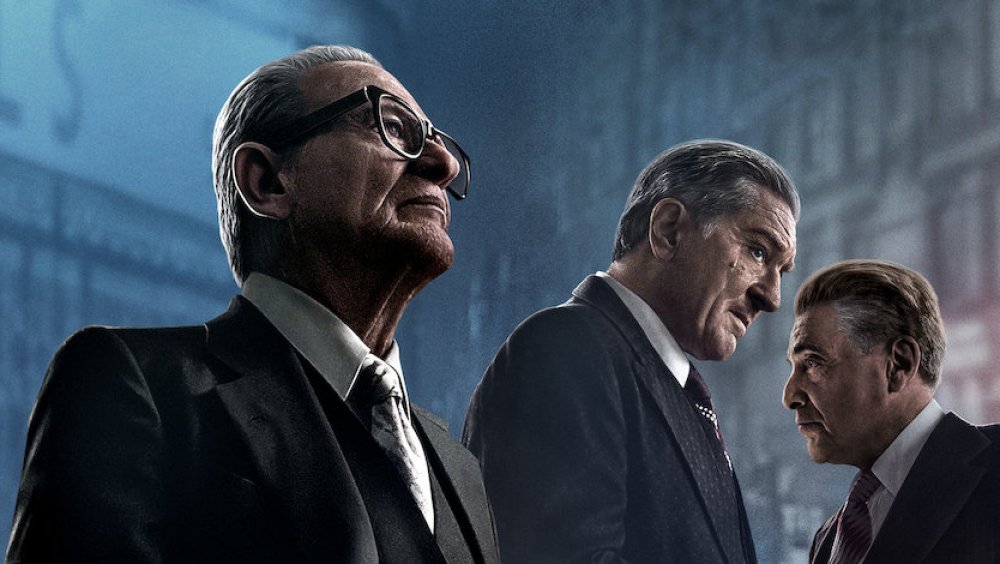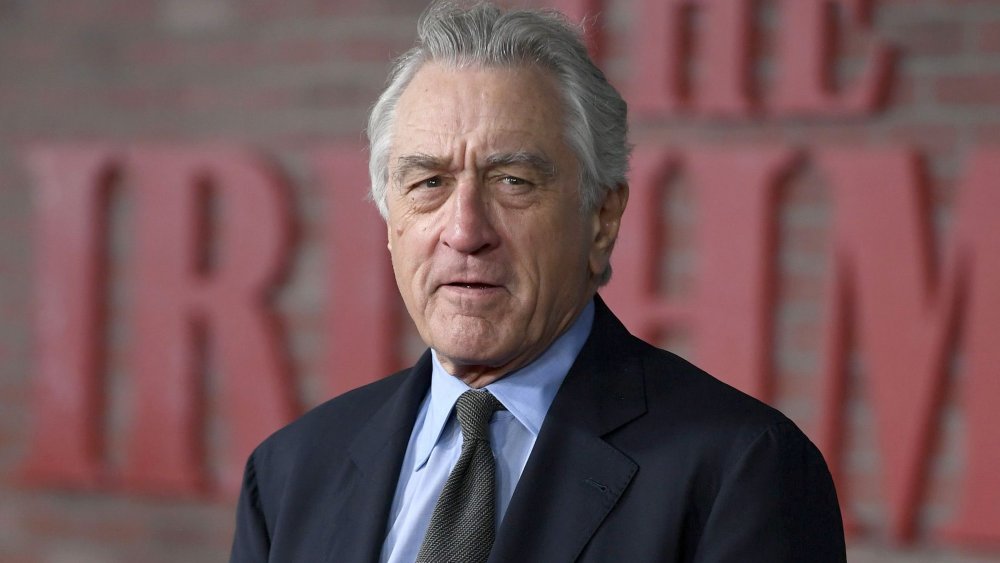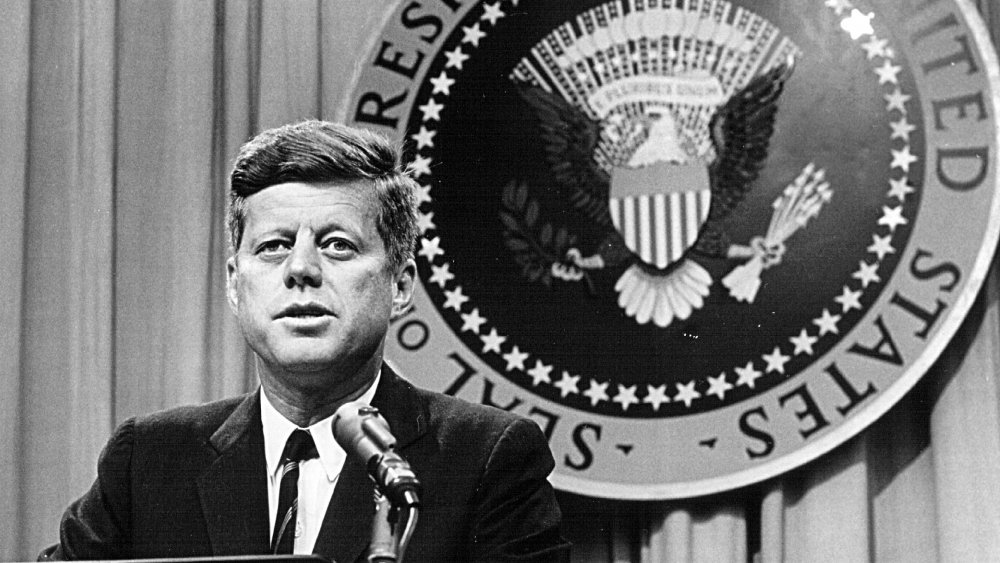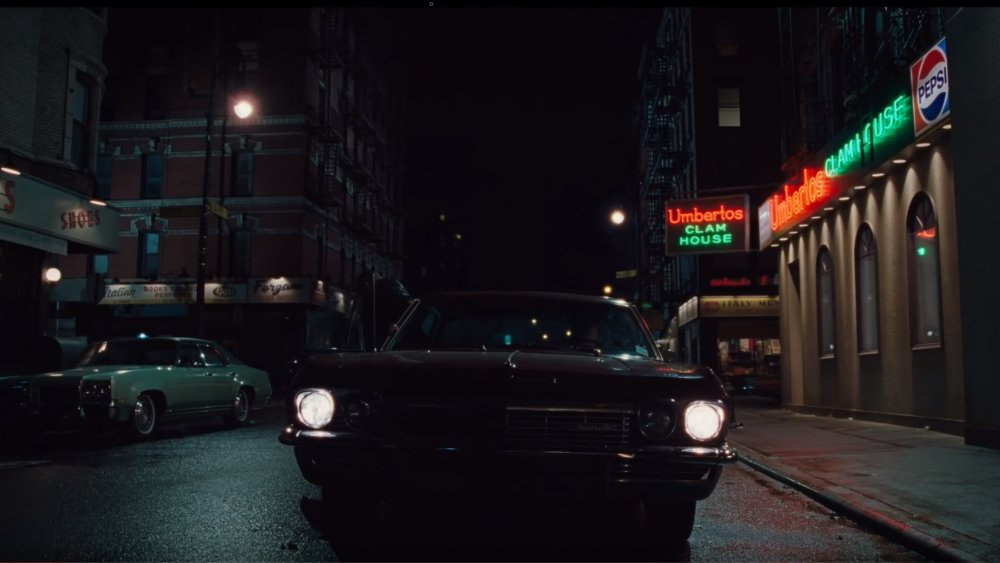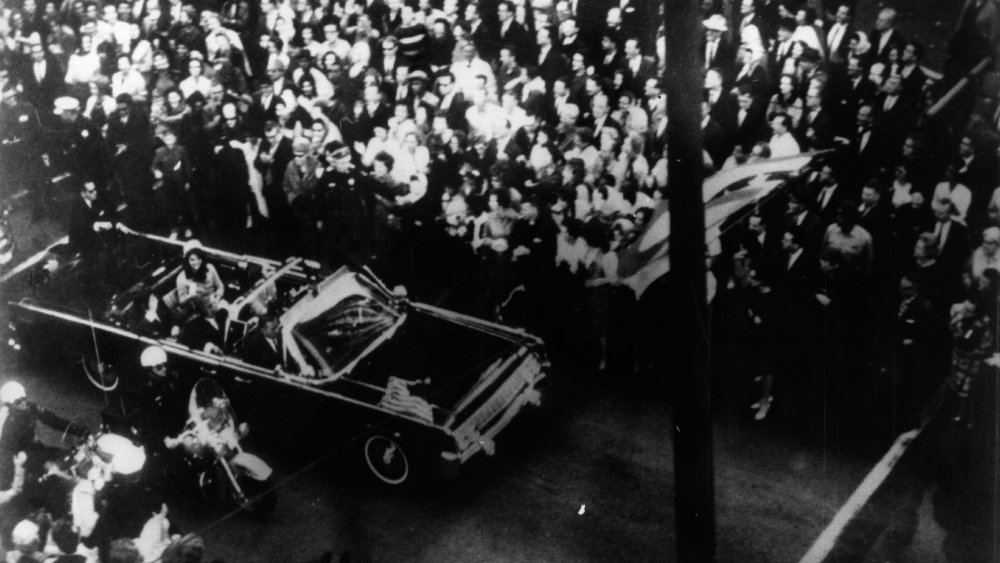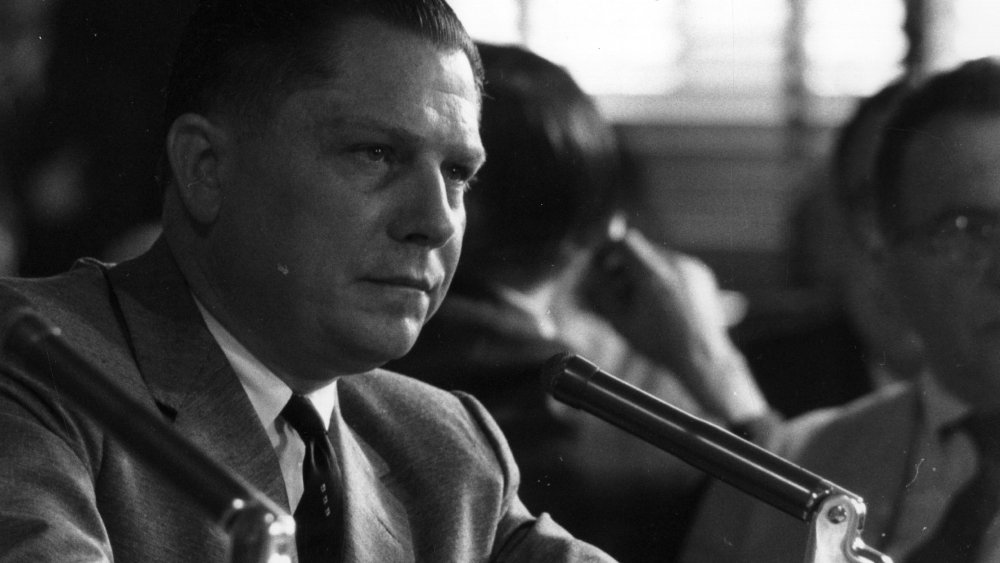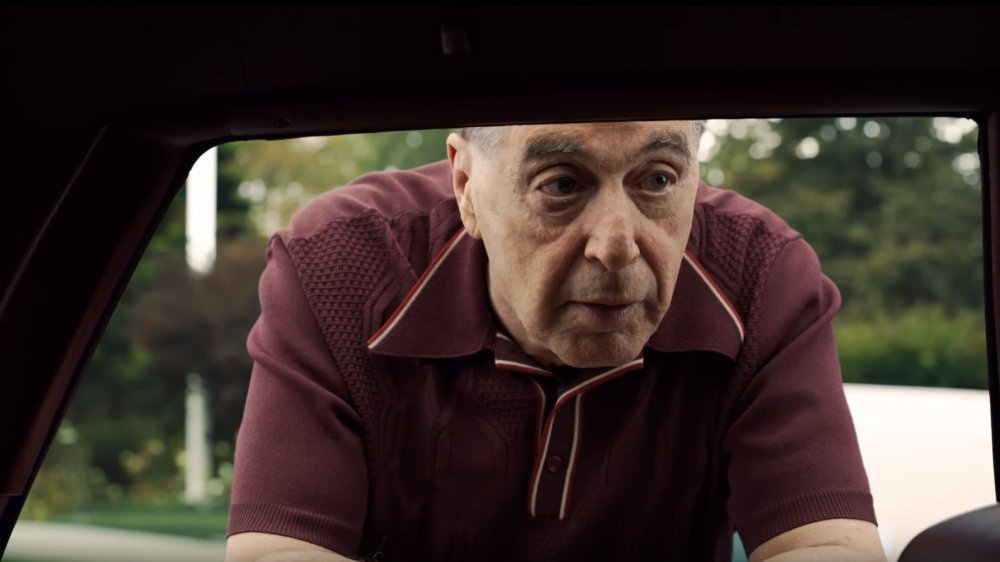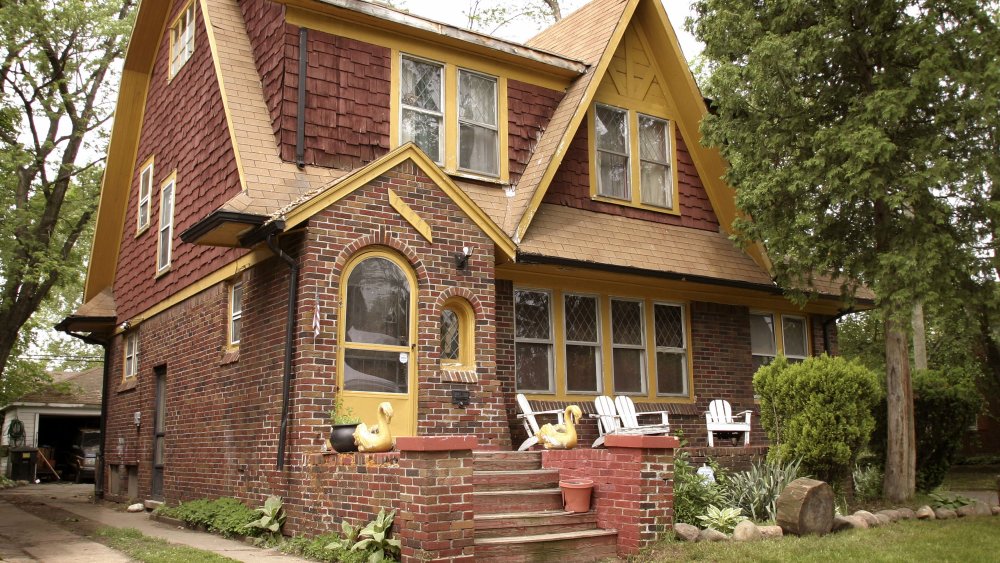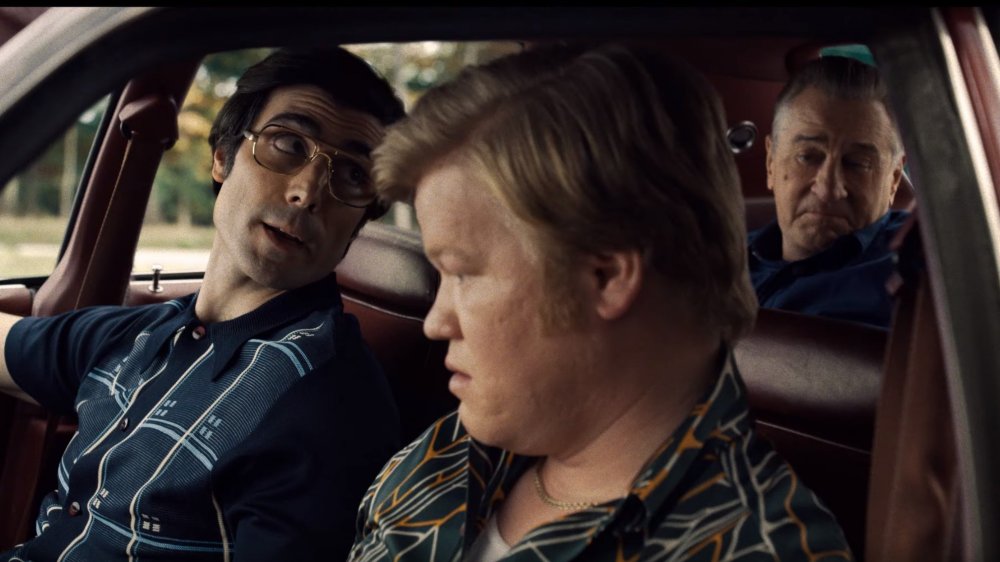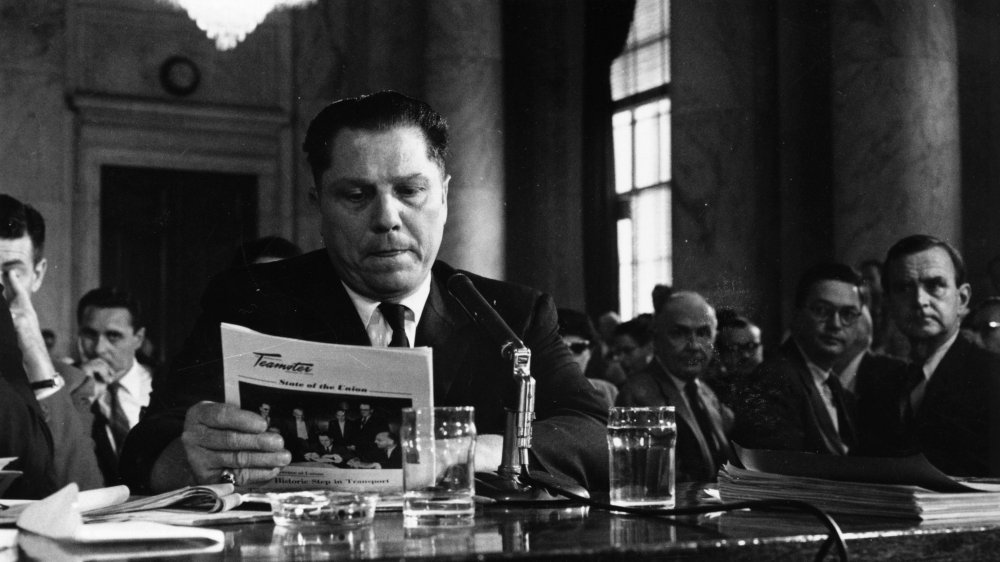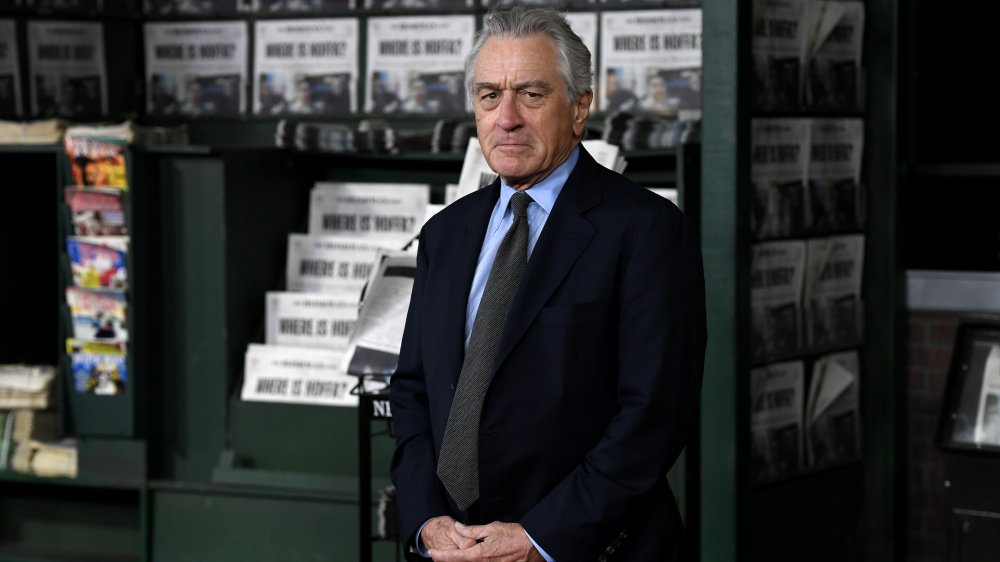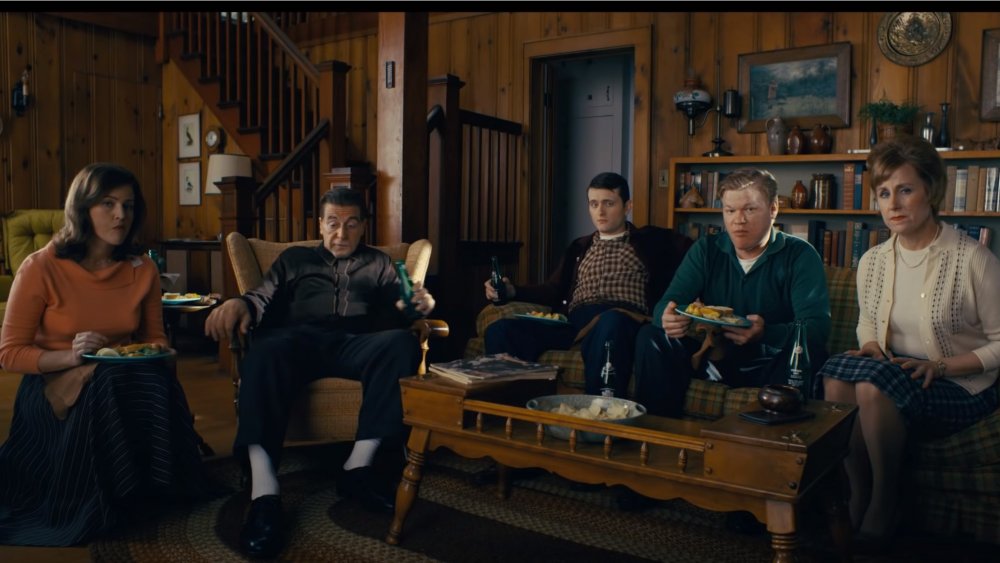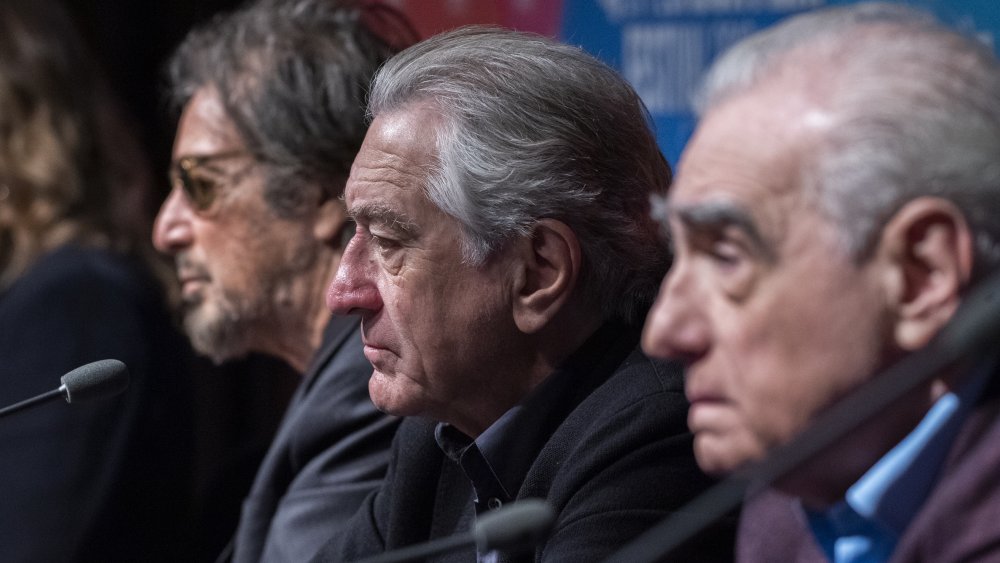Here's The True Story Behind The Irishman
At first glance, The Irishman has everything 99 percent of cinema-goers could possibly want. The cast list is filled with heavy hitters like Robert De Niro, Al Pacino, and Joe Pesci (who we haven't heard from in a while), and league-of-his-own Martin Scorsese is at the helm. It's got the mafia, ridiculous conspiracy theories, shadowy figures with a terrifying amount of power, and — it claims — the answer to one of recent history's most notorious unsolved crimes.
But does it really have the right answer?
The Irishman isn't alone in claiming to be based on a true story. It was adapted from the book I Heard You Paint Houses, written by Charles Brandt and based on interviews with Frank "The Irishman" Sheeran (via The Guardian), but here's the thing — he's not the most reliable narrator when it comes to pesky things like "the truth." Sheeran tells a fascinating tale, for sure, and he puts himself right in the middle of everything from the Bay of Pigs and the Kennedy assassination to, of course, Jimmy Hoffa's disappearance. Could one person really be involved in all that? Considering we really only have his word on the matter and others on that particular side of the law are notoriously tight-lipped, there's a lot that's just not known. Snitches might get stitches, but on the flip side, we do know a bit about the real events depicted in Scorsese's epic.
Who was Frank Sheeran ... really?
Frank Sheeran (Robert De Niro) is the Irishman at the center of The Irishman, and Slate did a deep dive into the claims he made in Charles Brandt's I Heard You Paint Houses. Essentially, Sheeran said he was coming clean — he knew he was nearing the end of his life, and he wanted to confess the secrets he'd been carrying around for decades. So what's the real story?
While there's no real way to definitively prove or disprove many of his claims, they did find that he was — by most accounts — a minor player in the South Philadelphia mafia who really did hang with the likes of Russell Bufalino. But those who knew him said he was a far cry from the version brought to the screen. One of his contemporaries in the Irish mafia, John Carlyle Berkery, described him like this: "Frank Sheeran never killed a fly. The only things he ever killed were countless jugs of wine. You could tell how drunk he was by the color of his teeth: pink, just started; dark purple, stiff."
They interviewed FBI agents, law enforcement, prosecutors, and reporters, and no one had ever even suspected him of killing anyone. He did get law enforcement's attention a few times: he once beat up a non-union truck driver, and he was indicted for the murder of union rivals, but hired others to actually do the killing.
Was JFK's election really thanks to the mob?
Mob influence reaches a long, long way, and The Irishman shows names being plucked form tombstones then registering votes for JFK. Did that happen?
According to an investigation by the New York Herald Tribune and The Washington Post (via Newsweek), yes, it did. Earl Mazo was a reporter who headed up a planned 12-part series on election fraud, and one of the things he found when he started matching voter names and addresses was that some of those names were, indeed, taken from tombstones in a Chicago cemetery. Others were registered to a house that had been gutted by fire, and stood abandoned — but had 56 voters registered as living there. Only four of the stories in the series were ever run, and the rest were squashed after a phone call from Richard Nixon.
That's not the only time claims of election interference were brought up. In 1997, the Los Angeles Times reported on a book that claimed JFK had been elected with help from the mafia, who made sure he won the state of Illinois. That book was, of course, highly controversial, but the 1960 presidential election was surrounded by accusations of voter fraud, recounts, and, says Slate, counties where the votes were so overwhelmingly in Kennedy's favor that they just had to be disputed.
Crazy Joe Gallo's murder is officially still unsolved
According to Sheeran, he was the one who killed Crazy Joe Gallo as he dined with his family at Umberto's Clam House. The motive? He says it was all because Gallo was rude to Sheeran's boss and friend, Russell Bufalino (Joe Pesci). Bufalino gave the nod, and Sheeran gave him a hail of bullets. But that's not the official story at all — that was broke wide open by Nicolas Gage, a reporter for The New York Times who had (via Slate) spent years covering the mob. He told a different tale.
When The New York Times ran their story, they reported the killing had come because of a dispute with the Colombo family. They had marked Gallo for death months before he was killed, and everyone in the family knew it. When an informant named Joseph Luparelli saw Gallo at Umberto's, he got up, left, and headed straight for a nearby restaurant where he knew he could find representatives of the Colombo family. He found them, told them where to find Gallo, and within 45 minutes they were back at Umberto's and armed to the teeth.
Gallo was eating dinner with his family when he was shot, and his new wife, Sina Essary, described the hitmen as "little, short, fat Italians," which is absolutely nothing like a description of the 6-foot-4 man known as The Irishman.
Did Frank Sheeran help kill JFK?
It's just a single line, uttered by Joe Pesci's Russell Bufalino. It has huge implications, though, and it's this: "If they can knock off a president, they can knock off the president of a union."
He's talking about the idea that the mafia was behind the assassination of JFK, and Esquire says one of the confessions Sheeran made to Brandt was that he had been the one to delivered rifles to Dallas — rifles that were the same kind used to kill Kennedy. Scorsese left that incident out of the film because, he told IndieWire, it crossed just a little too far into conspiracy theory territory, and he didn't want to take away from the rest of the story the characters had to tell. But the real Sheeran did make the claim ... so is it true?
No. The National Archives contains a huge amount of information on things that have come out about the Kennedy assassination, including details on the Mannlicher-Carcano rifle that had been left in the Texas School Book Depository. It had originally come from Crescent Firearms, and was shipped to Klien's Sporting Goods in Chicago. There, it was bought by someone named A. Hidell and shipped to Dallas, Texas. The handwriting on the order form was a match to the handwriting of Lee Harvey Oswald, and the P.O. box it was shipped to had been rented by him as well.
Jimmy Hoffa, the mob, and Las Vegas
Jimmy Hoffa (Al Pacino) is a larger-than-life figure with a life that's just as fascinating as his death, and one of the claims made in The Irishman is that he had his hands in pretty much everything — and he did. And yes, according to the Los Angeles Times, that absolutely includes loaning Teamster money to the mobsters that built Las Vegas.
Throughout the 1950s and 60s, hundreds of millions of dollars from the Teamsters Central States Mention Fund were funneled into Vegas through mobsters like Moe Dalitz. (Hoffa also had a stake in New York City taxi drivers, too — when he set his sights on taking control of some 30,000-odd cabbies, he had help there from labor extortionist Johnny Dio.)
At the time, there was somewhere around a billion dollars in the pension fund, which Vanity Fair says Hoffa created by consolidating the pension funds from across 22 different states. Payments went from the fund to Vegas hotels through Hoffa and attorney-to-the-mob, Sidney Korshak, who not only helped get casinos like the MGM built, but who charged a more-than-generous fee for his services.
What, exactly, were the circumstances of Jimmy Hoffa's disappearance?
At the heart of The Irishman is the mystery of what happened to Jimmy Hoffa. So how does what we know stack up with what they showed? According to Biography, Hoffa really was at the Machus Red Fox Restaurant in Bloomfield Township, Michigan, on July 30, 1975. He had driven there in a green Pontiac Grand Ville, and was waiting for Anthony Giacalone and Anthony "Tony Pro" Provenzano. The point of the meeting? To mend some fences, but both parties have consistently denied there was any such meeting scheduled (via The New York Times). At 2:15 he called his wife to say he planned on being home by 4 p.m. He never went home, though, and his car was found in the restaurant's parking lot the next morning.
The disappearance of the gangster came — as The Irishman suggests — not long after Hoffa received a controversial presidential pardon from Richard Nixon. Part of the deal was that he was supposed to stay out of union business until 1980, but he was already in the process of trying to take power back from Frank Fitzsimmons.
There was a single concrete lead in the case — dogs detected Hoffa's scent in the back of a Mercury Marquis Brougham, belonging to the son of one of the two men Hoffa had been waiting to meet with. Nothing ever came of it, though, and in 1982, Hoffa was officially declared dead.
The blood at the house where Jimmy Hoffa (supposedly) died
When Sheeran's biography was released, law enforcement took the claims seriously. Since he specified exactly which house he had killed Hoffa in, authorities were able to go there and look for any evidence that may have been left behind by a clean-up crew. According to CNN, among the first to conduct an investigation were two retired police officers hired by Fox News. They claimed to have found "seven to eight" spots of blood on the home's floorboards, which led to more authorities being brought in on the case.
County Prosecutor David Gorcyca was doubtful anything would come of the investigation, and was quick to add that it wasn't even clear the blood on the floor was human.
That was in May 2004. Fast forward almost a year, and a very, very short update went out through the Associated Press (via Deseret News). The blood found on the floor was not, in fact, Jimmy Hoffa's. It was another Sheeran claim that was short on proof.
That fish? It was a salmon
The Irishman shows Hoffa getting into a car at the Machus Red Fox, one driven by Chuckie O'Brien. There's a very long conversation about a wet spot on the back seat, and the car's occupants discuss it. O'Brien says it was from a fish he'd just dropped off to a friend, and the conversation just keeps going. They talk about what kind of fish it was, why he was delivering a fish ... it's a weird scene that doesn't really go anywhere, but there's actually a point to it.
According to a 1975 article in The New York Times, investigators really did find stains in the back seat of a car owned by Joseph Giacalone and borrowed by Chuckie O'Brien. He insisted that it was blood from a salmon he had just delivered to a friend, and further investigation confirmed that yes, it was fish blood.
At the time, it was a big deal. It looked like a smoking gun as far as evidence was concerned, and ended up being the precise — albeit strange — thing that O'Brien had insisted it was, and instead of giving investigators some serious evidence, it went nowhere.
What are some of the theories of what happened?
Hoffa's body has never been found, and there's a very simple, very logical explanation, according to The Irishman: he was cremated. Even Sheeran's staunchest skeptics have to admit that makes a lot of sense. Why transport the body somewhere and bury it when you could just dispose of it permanently and easily right where he was killed?
The investigation that followed Jimmy Hoffa's disappearance was the very definition of a circus. Around 70 people were put in front of a grand jury, law enforcement dug a lot of holes based on a lot of dead-end tips, and a hypnotist was even called in to work with the employees of the restaurant Hoffa had disappeared from. And some of the long-standing theories about what happened to Hoffa are way more implausible than Sheeran's story. Buried under Giants Stadium? Really? Talk about an unnecessary amount of work and risk.
In 1976, the FBI compiled the Hoffex, essentially a list of all suspects and persons of interest in the case. Now, the big question: was Sheeran on it? Yes. He was the last entry in a section titled "Suspects Outside of Michigan," and he was described as a "known associate" of Russell Bufalino. He was also known to have been in Detroit at the time Hoffa disappeared, and was, indeed, known to be a close friend of the union leader.
Frank Sheeran previously said he didn't do it
Here's the thing about Sheeran — his tell-all confessional to Charles Brandt isn't the first time he spoke out about what happened to Hoffa, and it wasn't even the second. Sheeran has told a ton of different versions of the story over the years.
In 1995, he spoke with The Philadelphia Daily News and made some wild claims. According to that story, he was going to tell his biographer (then John Zeitts) the truth, including: "I did not kill Hoffa. I had nothing to do with it. But I never had the answer until 1988." He went on to claim that Hoffa had been killed by contract killers hired by Nixon and the White House, and also said the body would never be found. Within a year, he came forward claiming to have documents that showed the location of Hoffa's remains after all, and by then he was claiming Nixon had hired Vietnamese mercenaries to kill Hoffa.
It wasn't until 2001 that Sheeran first claimed to have been the one who actually killed Hoffa (via NY Books). At the time, various news outlets declined running with his story because of his track record of making false claims, and between 2001 and 2003, he alternately said he had killed Hoffa in a car before destroying the body and the evidence, that he just disposed of the body but hadn't killed him, and then finally he recited the tale that made it into The Irishman.
The compelling evidence for Chuckie O'Brien's innocence
The Irishman includes one claim that's been repeated often — Hoffa's long-time friend and aide Chuckie O'Brien was the one who picked him up and drove him to his death. That's been said a lot, but according to former Justice Department legal counsel and Harvard law professor Jack Goldsmith, it's absolutely not true.
Goldsmith has a personal connection to the matter — he's O'Brien's stepson, and he was 12-years-old when Hoffa disappeared. He's spent years trying to clear his stepfather's name, and has condemned The Irishman for repeating the accusations that destroyed O'Brien's life. That's in spite of the fact, he says, O'Brien had an alibi and was never charged with anything associated with Hoffa's disappearance.
Goldsmith has written extensively (via NY Books) on Hoffa's disappearance and on his stepfather's innocence, and says there's a few huge problems with telling Sheeran's tale in such a high-profile way. One is the repetition of O'Brien's involvement — which the FBI and law enforcement have acknowledged didn't happen as it's portrayed — and that's put a very bright spotlight on someone who's still alive. He says it also distracts from the larger issues of Hoffa's sprawling control over so many aspects of the nation's economy, which is largely overlooked in favor of telling the far juicier story of murder ... true or not.
Robert De Niro was cautioned against making The Irishman
Robert De Niro got the rights to make The Irishman based on Brandt's book in 2007, and investigative journalist and Hoffa author Dan Moldea says he spent a good amount of time warning De Niro that he had been "conned," and that he was making a movie based on a completely false confession. It wasn't the first time Moldea had something to say about Sheeran's confession, either — when the book came out, Moldea went on the offensive condemning it as pure fiction (via Deadline Detroit).
When push comes to shove, many of the claims made in The Irishman are a matter of he-said, he-said. There's no way to prove or disprove a lot of it, that's just the nature of this sort of film — especially when it's based around a long-standing mystery, and especially when most of the main characters are dead.
But De Niro has since come out with a statement that's pretty interesting, and he addresses the backlash around the accuracy of the film. He had this to say (via Cinema Blend): "I wasn't getting conned. I have no problem with people disagreeing. ... we're not saying we're telling the actual story, we're telling our story. I believed it." So, there you have it. De Niro believed in it, not many other people do, he doesn't claim it's the truth, and as for Hoffa's disappearance? It's still not known what happened to him, and it'll probably always stay a mystery.
